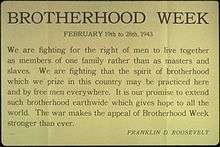National Conference for Community and Justice
The National Conference for Community and Justice was an American social justice organization focused on fighting biases and promoting understanding between people of different races and cultures. The organization was founded in 1927 as the National Conference of Christians and Jews in response to anti-Catholic sentiment surrounding Al Smith's run for President. The national organization dissolved in 2005 following a diminishing of its endowment, but individual chapters around the country carry on the organization's mission.
 Logo of the NCCJ | |
| Abbreviation | NCCJ |
|---|---|
| Successor | Individual local chapters National Federation for Just Communities |
| Formation | 1927 |
| Extinction | 2005 |
| Headquarters | New York, NY |
Region | United States |
Formerly called | National Conference of Christians and Jews |
History
The NCCJ was established in 1927 by social activists to bring diverse people together to address interfaith divisions.[1][2] Over the course of its history, the organization expanded its purview to all issues of social justice; in 1998 its name changed from "National Conference of Christians and Jews" to "National Conference for Community and Justice".[3]
By the early 2000s, the organization was facing financial difficulties as endowment dropped from $22 million in FY2002 to $4 million in FY2004, due to a slowing economy and reduced contributions. Local chapters began to sever ties, and by 2005 the national organization had dissolved.[4][5] A number of the former chapters created the National Federation for Just Communities in 2006.[4]
Programs and events
The NCCJ promoted inclusivity through various events and programs. One of the first was the "Tolerance Trio", a traveling roadshow which toured the country with a priest, a rabbi, and a clergyman, all making jokes and providing entertainment.[1] Throughout its tenure, the NCCJ offered interfaith events, school-age programs, and youth leadership programs aimed at promoting values such as understanding, respect, and community building.
Anytown
The "Anytown" program began in the 1950s and was designed for youth ages 14–18.[6] It was intended to educate and empower its participants through multi-day intensive retreats. In 2018, the San Francisco Chronicle published an investigation into two such retreats organized by NCCJ successor organizations. The investigation expressed criticism and concern over "questionable and potentially harmful methods" at the experiential learning camps.[6]
Brotherhood Week

The NCCJ promoted a "National Brotherhood Day" in the 1930s, expanding to Brotherhood Week starting in 1936 with President Franklin D. Roosevelt named honorary chairman.[1] In 1944 the week included extensive radio programming, military and USO participation, and an "education program of nationwide scope" aimed at "extending good will and understanding among religious groups".[7] By the early 2000s the event had lost relevancy and was eventually canceled.[1]
Tom Lehrer satirized National Brotherhood Week in a 1965 song of the same name, recorded on his album That Was the Year That Was.[1]
References
- Goren, Jennifer (February 21, 2018). "Whatever became of National Brotherhood Week?". The World. Public Radio International. Retrieved October 22, 2019.
- "Conference Outlines a Wide Campaign of Good-Will Among All Classes". The New York Times. December 11, 1927. Retrieved December 8, 2018.
- "National Conference of Christians and Jews Changes Its Name to Better Reflect Its Work and Inclusivity". The Boston Globe. June 14, 1998 – via Pluralism Project.
- Drury, Tracey (December 13, 2006). "NCCJ changes name with new affiliation". Buffalo Business First. American City Business Journals. Retrieved October 22, 2019.
- Sherman, Bill (May 8, 2005). "Tulsa's NCCJ chapter drops national affiliation". Tulsa World. BH Media Group. Retrieved October 22, 2019.
- de Sá, Karen (June 14, 2018). "Retreat's Risky Lessons: Decades-old 'leadership' camps push teens to the brink with unproven, painful methods". San Francisco Chronicle. Hearst. Retrieved October 22, 2019.
- "National Conference of Christians and Jews Announces Measures Against Racial Bias" (Press release). February 18, 1944. Retrieved October 22, 2019 – via Jewish Telegraphic Agency.